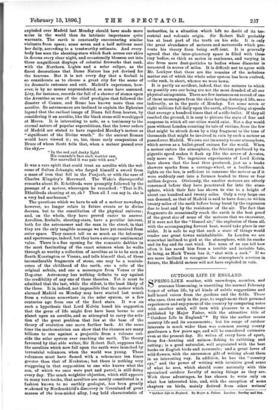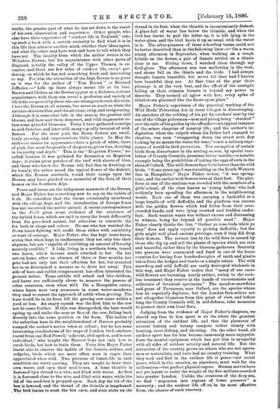OUTDOOR LIFE IN ENGLAND.
SPRING-LIKE weather, with snowdrops, aconites, and crocuses blossoming, is unsettling the normal February torpor of urban life, by all kinds of subtle suggestions and half-heard voices from the gardens and the fields. Those who care, thus early in the year, to supplement their personal experiences and enjoyment of the country by comparing notes with another mind, will turn with pleasure to a volume published by Major Fisher, with the attractive title of "Outdoor Life in England."* By this the author means country life and its amusements ; but his range of outdoor interests is much wider than was common among county gentlemen a few years ago, and will be considered extensive even at the present day. He writes of every form of sport, from fox - hunting and salmon- fishing to rabbiting and ratting ; is a good naturalist, well acqnainted with the best books on English birds and mammals ; and a great lover of wild-flowers, with the uncommon gift of writing about them in an interesting way. In addition, he has the " country eye," and the power of writing with intuitive good sense of what he sees, which should come naturally with this specialised outdoor faculty of seeing things as they are. With these advantages, he has chosen to write only on what has interested him, and, with the exception of some chapters on birds, mainly derived from other writers'
• Outdoor Life in Eng'and. ST Major A. Fisher. Loudon: Benkluy tad Son.
works, the greater part of what be has set down is the result of- his own observation and experience. Other people, who also have their experience of "outdoor life in England," take up such a book with a certain curiosity to find what it is in this life that attracts another mind, whether their ideas agree, and what the other may have seen and have to tell which they have not. The locality from which the author writes is the Wiltshire Downs; but his acquaintance with other parts of England, notably the valley of the Upper Thames, is ex- tensive, and there are few sides of outdoor life, except gar- dening, on which he has not something fresh and interesting to say. For him the attraction of the high Downs is as great as it was for the author of " Tom Brown " or Richard Jefferies :—" Life up there always seems life at its best. Barren and lifeless as the Downs appear at a distance, a closer acquaintance with them can reveal a. profusion and variety of life little suvected by those who are strangers to such districts. I love the Downs at all seasons, but never so much as when the autumn skies are blue, and the air clear, crisp, and invigorating. Although it is somewhat late in the season, the gentian still blooms, and here and there dropwort, and wild mignonette re- tain some graceful blossoms. Twice I have gathered cowslips in mid-October, and later still, many a goodly bouquet of wild- flowers. For the moat part, the Down flowers are small, lowly growing, and unpretentious little plants. In May the milk wort makes its appearance—here a patch of white, there of pink, but most frequently of deepest sapphire hue, dazzling in its purity and depth." This is the "Rogation Flower," so- called because it was gathered for decoration on Rogation days ; it stains great patches of the turf with sheets of blue, and those who know the Downs will feel that in dwelling on its beauty, the writer noted the typical flower of the district, which the Roman sentinels, round their camps upon the Downs, may have plucked as a memorial of the flora of their homes on the Southern Alps.
Foxes and hares are the indigenous mammals of the Downs, and Major Fisher has something new to say on the habits of b ,th. He considers that the vixens occasionally interbreed with the village dogs, and the introduction of foreign foxes has not improved the native animal. A recent correspondence in the Field gives some evidence of the existence of the hybrid foxes, which are said to carry the brush differently from the pure-bred animal, but otherwise to resemble the fox both in shape and colour. No one who has watched the Dawn hares fighting will credit them either with amiability or want of courage. Major Fisher, who has kept tame hares, states that when kept in confinement they not only lose their shyness, but are " capable of exhibiting an amount of ferocity scarcely credible." A lady, living in a northern town, tamed two hares, which became much attached to her. On her return home, after an absence of three or four months, her pets had not only lost their affection for her, but attacked her in so determined a manner as to drive her away. This side of hare and rabbit temperament has often interested the present writer. Tame rabbits will attack and bite children, and hares are sufficiently clever to measure the powers of other creatures, even when wild. On a Hampshire estate, where hares were very numerous in some water-meadows, they used to resent the approach of cattle when grazing. The hare would lie in its form till the grazing cow came within a yard or less. An angry squeak was the first hint to the cow not to come further. If this was disregarded, the hare would spring up and strike the nose or face of the cow, falling back directly into the same position on the form. The habits of the suburban hare in the neighbourhood of Harrow probably escaped the author's notice when at school ; but he has some interesting recollections of the ways of London bird-catchers, learnt from one Ned Powell," a decent, civil-spoken, and honest individual," who taught the Harrow boys not only how to catch birds, but how to train them. From him Major Fisher learnt also to observe the habits of the linnets, siskins, and redpoles, birds which are more often seen in cages than appreciated when wild. Two pictures of linnet-life in each condition are worth quoting. They are taught to draw their own water, and open their seed-boxes. A bone thimble is fastened by a thread to a wire, and filled with water. At first it is fastened close to the wire, and filled with water, while the lid of the seed-box is propped open. Each day the lid of the box is lowered, and the thread of the thimble is lengthened. The bird learns to push the box open, and soon picks up the
thread in its foot, when the thimble is inconveniently distant. A glass full of water lies below the thimble, and when the bird has learnt to pull the latter up, it is left lying in the water-glass, and the bird hauls it up as usual, with the water in it. The after-pleasure of these schoolboy tastes could not be better described than in the following lines On a warm sunny afternoon in September, when walking on a rough hillside on the downs, a pair of linnets settled on a thistle close to me. Sitting down, I watched them through my field-glass. The afternoon sun was mellowing in the west,. and shone fall on the thistle and the birds. I had always- thought linnets beautiful, but never till then had I known how beautiful they are. At that time of the year their- plumage is at the very best, and the effect of the sunlight. falling on their crimson breasts is beyond my power to• describe. They seemed all aglow with fire ; every spike of thistledown glistened like the finest-spun glass."
Major Fisher's experience of the practical working of the Wild Birds' Protection Act in rural villages is discouraging. An anecdote of the robbing of his pet fly-catchers' nest by the son of the village policeman—nest and young being " chucked"' over the rails of his garden by the offender—is a typical instance of the minor chagrins of country life ; and the author's in- dignation, when the culprit whom his father bad engaged to chastise, was seen "swaggering down the street next day looking by no means the worse for wear,"—not a solitary expe- rience of would-be bird-protectors. The exemption of certain birds from disturbance in the nesting season, by special reso- lution of County Councils, promises better results,—a notable• example being the prohibition of taking the eggs of owls in the shire of Oxford. The wild-flowers fare little better than the wild birds. " Some years ago I was travelling on the South-Western line in Hampshire," Major Fisher writes, "it was spring- time, and the earlier wild-flowers were at their beat. The plat- form at one of the stations was crowded with the members of a. girls'-school, of the class known as young ladies,' who had evidently been spending the afternoon in the neighbouring woods. Each one of them was carrying a basketful or a large bundle of wild daffodils, and the platform was strewn with the golden flowers which had fallen from their over- crowded bands, and were lying crushed and trodden under- foot. Such wanton waste was without excuse and distressing to witness, being far beyond all possible need." Major- Fisher clearly thinks the line, " Gather ye rose-buds while ye may," does not apply equally to picking daffodils; but the girls might well plead ancient privilege, even if they did drop their flowers. The serious loss to the wild flora is caused by those who dig up and sell the plants of species which are rare and beautiful, rather than by the blossom-gatherers. Recently two persons were summoned and fined in one of the home counties for baying four hundredweights of earth and plants, taken from the hedges and banks on a single estate. The wild snowdrop and wild daffodil are easily destroyed wholesale in this way, and Major Fisher states that " many of our rarer wild-flowers are becoming nearly extinct, owing to the ruth- less treatment they receive at the hands of excursionists and collectors of botanical specimens." The meadow-snowflake and grass of Parnassus, near Oxford, are the species whose loss he especially deplores; but the London fern-sellers are not altogether blameless from this point of view, and before long the County Councils will, in self-defence, take measures to protect their own local flora.
Judging from the evidence of Major Fisher's chapters, we- should say that to him sport is on the whole the greatest attraction of the outdoor life, and that the pleasures of natural history and botany compete rather closely with: hunting, trout-fishing, and shooting. On the other hand, alt outdoor sport has for him become immensely more enjoyable from the mental equipment which has put him in sympathy with all sides of outdoor activity and natural life. Bat the attraction of the country grows on others who are not sports- men or naturalists, and have had no country training. What they seek and find in the outdoor life is peace—not social peace, which in the country, as elsewhere, must wait for the millennium—but perfect physical repose. Human nerveshave- not yet learnt to resist the weight of the five millions crowded' into greater London. Unlike the creatures of the deep sea, we find ' migration into regions of lower pressure" a. necessity ; and the outdoor life offers, in its most effective form, the chance of such recovery.



































 Previous page
Previous page